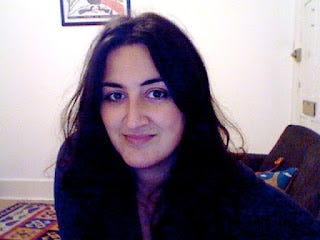Journeys: Mina Gorji
Our blog this week is written by Mina Gorji, author of the forthcoming January collection, Art of Escape.
Among Mina Gorji's poems in New Poetries V (2011) was one about Houdini entitled 'The Art of Escape' which returns here as the title poem. This colourful and vivid first collection continues the course of Mina Gorji's meticulous explorations of 'the strange and sometimes darker side of nature' and the different forms and meanings of escape: dandelions crossing the ocean, the journey of a gall wasp from Aleppo to England, the transformation of an armadillo into music. These poems shift by degrees until new patterns and sounds emerge, transforming the familiar into unexpected configurations. Art of Escape is a wonderful casting off into the complex waters of adult life, in which change has become the constant.

There it was. Moving. On the lettuce leaf. Black with a distinctive pattern, like a white skull. Impossible to mistake – easy to imagine its menace. The false widow spider, Steatoda nobilis, probably arrived with the bananas and made its way to the cool green salad leaves and onto my plate. So many other tiny creatures arrive here in this way – on boats, in planes, inside suitcases. Alien species. Or else they are introduced to serve particular purposes – like the oak marble gall wasp (Andricus kollari), brought over to make ink. Imagine that first wasp, emerging into English light. A tiny emigrant.
Or those larger creatures, brought to these shores as ornamental pets: muntjack, from China, shivering in the cold light, now eating primrose and hiding behind the rhododendron in suburban gardens. Or the bright green parakeets squawking in the silver birches in my parents’ garden in south west London. Ring-necked Parakeets - Psittacula krameri manillensis, sharing branches with pigeons and blackbirds. Escapees from Victorian aviaries. I’ve always loved those parakeets, the United Kingdom’s only naturalised parrot, according to the RSPB: long-tailed, bright green with a red beak and a pink and black ring around the face and neck. There are thousands now, squawking loudly all over London.
I think of my grandmother, who came here in the 1940s. I think of her standing on the steps of Waverly Station, in Edinburgh, standing in her bright red saree, the cold wind rushing past. She was always cold. So many journeys.
I wanted to think about those journeys. The plants - ragwort and dandelion- the creatures and the people who had made those journeys, myself included. I wanted to think about what it meant to escape and the different ways a poem might escape. A found poem, escaping from prose, from entries in dictionaries, like Daedulus, like Icarus? Or those words and phrases escaping from other poems, prose or paint catalogues, those sounds those cadences that break free into new forms. Escape. About the way the sounds we hear are always escaping. About the ways poems can escape certain fixed forms, can find new shapes. Or whether writers can escape identity politics. Poems had been my sanctuary. I love Yeats’ Innisfree. Its music. Marianne Moore’s chinoiserie. The obdurate quality. Bishop’s Giant Snail. I am too big. I feel it. Pity me. The Giant Pacific octopus with its gift of camouflage. Escaping notice in order to escape capture, or to hunt and surprise its prey.
Poetry is not a turning loose of emotion, but an escape from emotion; it is not the expression of personality, but an escape from personality. But, of course, only those who have personality and emotions know what it means to want to escape from these things.
It sounded so cold at first. Supine on the floor of a narrow canoe. But why might you want to escape emotions and personality? Into what cold blue heaven? Into whose arms? If you knew what pages and pages of tenderness I am not writing now. Not writing. Not marrying the woman who would have killed the poet in me. I’ll always remember sitting behind Valerie Eliot at a lecture in the British Library. She was surprisingly present. I could smell her perfume: Chanel Allure.

Mina Gorji was born in Tehran and grew up in London. She lives in Cambridge where she is a lecturer in the English Faculty, Cambridge and a fellow of Pembroke College. Her published work includes a study of John Clare, and essays on awkwardness, mess, weeds and rudeness. Her poems have appeared, among other places, in Magma, PN Review, London Magazine, The International Literary Quarterly and New Poetries V.



